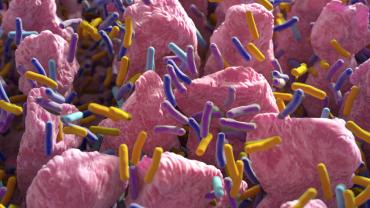
Probiotics are live microorganisms that may offer various health benefits to the human body; these may include supporting normal gut barrier function, helping intestinal microflora balance, lowering bacterial epithelial and mucosal adherence, and promoting healthy immune responses. Probiotics can be found in food sources, such as yogurt and sauerkraut, or in supplemental form.
Probiotics may help children with occasional diarrhea and constipation by supporting normal bowel motility and consistency of feces. A systematic review and meta-analysis (n = 498) observed that children with constipation taking probiotic supplements had an increase in stool frequency, possibly due to an increase of short-chain fatty acids synthesized from Lactobacilli and Bifidobacteria bacteria.
Although the exact relationship between the gut microbiome and diarrhea is unclear, disorders of gut flora composition have been observed in patients suffering from acute diarrhea. A recent meta-analysis (n = 4,911) was conducted to investigate 34 clinical studies. The conclusions indicated that children taking probiotic supplementation exhibited relief of occasional diarrhea, occasional vomiting, and hospitalization. Beneficial effects were found on stool frequency compared to treatments taken by the control group. The probiotic supplement strains examined were Bifidobacterium, Saccharomyces, Clostridium, Streptococcus, and Escherichia, ranging between 1.5 × 106 and 1.5 × 1011 bacteria. A network meta-analysis (n = 13,443) concluded that Saccharomyces boulardii was the most effective probiotic supplement that reduced occasional diarrhea in children compared to a placebo or no treatment, followed by several other single-strain and multi-strain probiotics.
One clinical study (n = 81) administered probiotics twice daily for 1 week to hospitalized children (6 months to 6 years old) who had acute diarrhea. The researchers determined that the children receiving probiotics had decreased clinical severity of diarrhea and fecal inflammatory markers, such as fecal lactoferrin and calprotectin, in comparison to children with the same symptoms who were not taking any probiotics. The children who were taking probiotics also had reduced abdominal pain or colic accompanying the diarrhea, and they also had decreased bloating or abdominal distension on days 7 and 14 of the experiment. Similar findings were made in a systematic review (n = 165) in which children with celiac disease taking probiotic supplements had reduced serum pro-inflammatory cytokines (mainly tumor necrosis factor-alpha).
The positive effect of probiotics on the intestinal microbiota and immune system in children may help with healthy food allergy responses. A food allergy is an abnormal immune response triggered by the consumption of allergens in foods or food additives, which is considered to be a public health problem for children. The prevalence of food allergies in children may be explained by the hygiene hypothesis, which can lead to alterations of the intestinal microbiota and lower than normal antigen responses. Similar to those who had acute diarrhea, it was shown that patients with allergies had differences in their gut microbiome composition both in number and diversity of species when compared to the patients with no allergies. More research is needed for further determinations.
Probiotic supplementation may be helpful in supporting a healthy gut microbiome, immune system, and intestinal gut barrier function in children with gastrointestinal disturbances, such as occasional constipation and diarrhea. Thus, probiotics may be clinically relevant to support overall gastrointestinal health for children.
By Danielle Moyer, MS, CNS, LDN